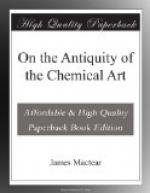Granting for the moment that the first knowledge of the sciences was obtained by the Arabians from the Greeks, we are at once face to face with the question. From whence did the Greeks obtain their knowledge? To any careful reader it will be clear that Grecian science and philosophy, like Grecian theology, was not of native birth. It is comparatively well known that the Greeks were indebted to the Egyptians for much of their theology as well as science. The great truths which really underlay the mysterious religious rites of Egypt seem to have been altogether lost when the Greeks wove their complicated system of theology; and we read that the Egyptian priests looked on the Greeks as children who failed to understand the great mysteries involved in their religious rites, disguised as they were in symbolic form. But, besides their indebtedness to Egypt, we will find that they also owed much to Persia, and through it again to Indian sources of knowledge.
There was constant communication between the Grecian and Persian nations. We learn that it was not uncommon for Grecian generals to take service under the Persian Satraps, tempted by the liberal recompence with which their services were rewarded. About the year 356 B.C. this system of Greeks accepting service under Persian Satraps nearly caused the outbreak of war between Greece and Persia—Chares, a Grecian commander, having assisted with his fleet and men, Artabanus, the Satrap of Propontis, who was then in revolt against the Persian king. But before this, during the great plague which desolated Athens in 430 B.C., and which also extended to Persia, Hippocrates was invited to go to the Persian Court; and it is on record that Ctesias was for seventeen years physician at the Persian Court about 400 B.C., during which period he wrote his history of Persia, and an account of India, which Professor Wilson, in a paper read to the Ashmolean Society of Oxford, has shown to contain notices of the natural productions of the country, “which, although often extravagant and absurd, are, nevertheless, founded on truth.”
There were, too, Grecian soldiers employed as paid auxiliaries, and a colony of Greeks who had been taken prisoners of war was founded within a day’s journey of Susa.
The great expedition to Persia, and the graphic description of the retreat of the “ten thousand” Greeks, given by Xenophon in his Anabasis, must have been well known to Alexander the Great when he set out on his career of conquest. He overthrew the Persian empire in 331 B.C., having destroyed Tyre and subdued Egypt in the previous year and carried his triumphant progress to the banks of the Indus, and there he “held intercourse with the learned sages of India.” On Alexander’s death Seleucus succeeded to the throne of Persia in 307 B.C., and not long after he forced his way beyond the Indus, and ultimately as far as the sacred river Ganges. He formed an alliance with the Indian king Sandrocottus (otherwise known as Chandra-gupta), which was maintained for many years, and it is said, also, that he gave his daughter in marriage to the Indian king, and aided him with Grecian auxiliaries in his wars.




